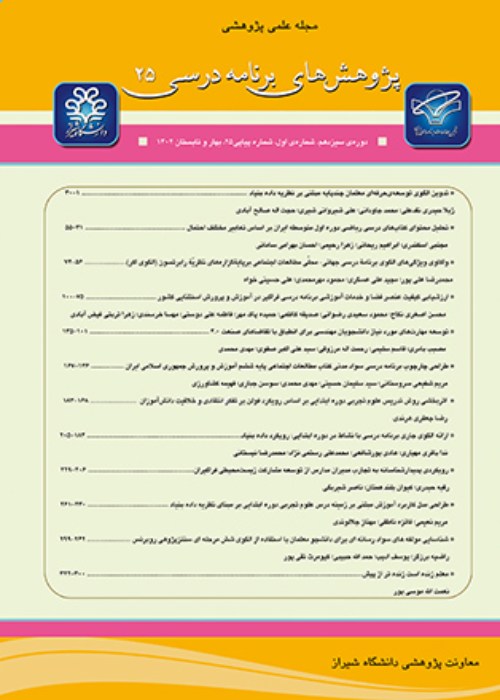A Critical Analysis of the Opportunities and Possibilities for Inclusive Pedagogy in the Theoretical Foundations of Iranian Formal Education
Plurality, diversity, and difference are indisputable realities of the world in which we live. Thus, any attempt to turn these qualities into one, unified, mono-logic entity is out of the question. In order to live in such a diversified world, we need an education that values diversity and plurality and rejects the exclusion and marginalization of others. Such education is ethically necessary as it not only makes schooling more just through the inclusion of all differences but also pursues to empower all students regardless of their differences and cultural or socioeconomic backgrounds. Traditionally, differences and diversity in schooling are regarded as a barrier to learning and a challenge for teachers and educators. That is why educational stakeholders, including teachers, may try to turn these differences into similarities and conformity. If difference and diversity are seen in a positive way by teachers, they will use them as a source of learning for both themselves and the students they are interacting with. Every classroom is a small field that represents different voices and perspectives that students bring with them to it. Ethically speaking, a pedagogy that embraces and values this plurality maintains educational justice and equity and can benefit both students and teachers. Thus, this paper intended to look into the theoretical foundations of Iranian formal education to see whether they afford opportunities and possibilities for a pedagogy that embraces diversity and difference. This requires, first of all, a conceptualization of inclusive pedagogy that is responsive to Iran’s cultural and social climate. This conceptualization, however, requires a critical evaluation as it is based on potential opportunities for inclusive pedagogy and not the true practice of education in reality. In this regard, the preconditions for the realization of a hypothetical inclusive pedagogy that can be inferred through a careful examination of theoretical and textual sources must be taken into consideration to avoid naive judgments or simplistic conclusions.
Research Questions:
This study sought to answer the following two questions: 1- What are the potential opportunities for inclusive pedagogy in the theoretical foundations of Iranian formal and public education? 2- What are the prerequisites for the implementation and realization of those theoretical grounds for inclusive pedagogy in Iran?
To address the first study question (i.e., identifying the theoretical grounds for an inclusive pedagogy), inductive qualitative content analysis was applied to inspect the data presented in a book entitled, “The Theoretical Foundations of Constitutive Transformation of Iranian Formal and Public Education (2011)”. Afterward, the conceptualized and theoretical grounds that were found to foster opportunities for an inclusive pedagogy were examined critically to identify some of the prerequisites needed for an inclusive pedagogy.
A close reading and inductive analysis of “The Theoretical Foundations of Constitutive Transformation of Iranian Formal and Public Education” (2011) led to the identification of six major concepts that were considered to form the potential constituents of an inclusive pedagogy. These six major themes were as follows: 1. educational equity, 2. diversity and distinction, 3. openness to otherness, 4. protection and improvement of freedom, 5. adjustable and open schooling, and 6. civil collaboration and intervention. It is worth noting that these potential theoretical opportunities are organically intertwined since they complement and support each other. It is also noteworthy that this conceptualization was done purposively and intentionally, i.e., the text was read in a way to serve the intention of the study. Thus, the realization of this theoretical capacity in the real world of education, provided that there is any will to do so, is dependent on the fulfillment of several prerequisites. Discussion and
Although a hypothetical basis for inclusive pedagogy could be drawn out of the theoretical foundations of Iranian formal education, there is no chance for such pedagogy to be materialized in the real world unless that hypothetical basis is turned into an authentic discourse. An inclusive pedagogy can claim its place as a discourse provided that the gap between the realm of theory and practice is bridged. This happens when the following five conditions are met. First, there exists an ethical commitment to the dynamicity of the concept of diversity in our educational thinking and planning. Second, structural contradictions in education are removed, i.e. removing the incongruity between the values that are recommended in theory and those promoted in practice. Third, students’ voices in both theory and practice of education are heard. Fourth, a pluralistic, multicultural teacher education approach is developed and practiced to train teachers to value and support difference and diversity. Fifth, democratic intervention by the public in educational decision-making is facilitated and supported. Accordingly, an inclusive pedagogy is a pedagogy that seeks equity in education through the inclusion of all students despite their individual, cultural, racial, and ethnic differences and is premised on the notion that difference and diversity are an opportunity rather than a threat. A true transformation of Iranian formal education, then, is achieved through recognition of diversity and difference and rejection of conformity in teaching and schooling.
- حق عضویت دریافتی صرف حمایت از نشریات عضو و نگهداری، تکمیل و توسعه مگیران میشود.
- پرداخت حق اشتراک و دانلود مقالات اجازه بازنشر آن در سایر رسانههای چاپی و دیجیتال را به کاربر نمیدهد.


